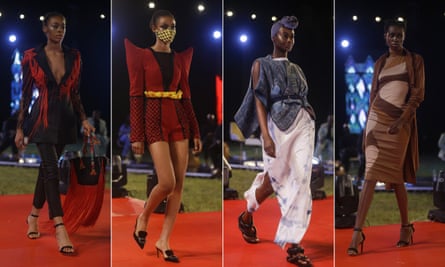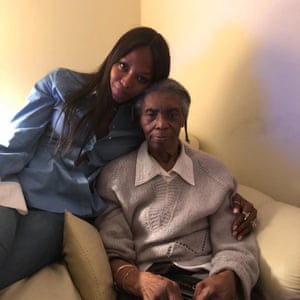With high-street brands collapsing and the world wearing sweatpants, 2020 has not been a stellar year for fashion. But at Arise fashion week, in Lagos, Nigeria, which concluded on Saturday, there were green shoots of hope, said Naomi Campbell. “There’s definitely a few stars here. I’m very impressed. Covid has brought out a lot of creativity in a lot of people.”
Campbell flew to Nigeria last week to take part in the African style showcase. “I was going to do it virtually,” she said by phone from Lagos, “and then I thought, you know what? I want to go and bring awareness to their great work. It’s important on many levels, because Arise gives these young designers a platform to be globally recognised, to be embraced by fashion weeks around the world, and really to be included.”
This year’s event took the socially-distanced format of a talent search. Thirty African designers aged under 30 were selected to show their collections to a virtual audience, with an overall winner chosen by a roster of judges including American artist Kehinde Wiley and South African designer David Tlale. The shortlist included non-binary sustainable label Lagos Space Programme, ultra-chic MmusoMaxwell and the eventual winner, Kenneth Ize, who showed at Paris fashion week for the first time this year. All received $5,000, while Ize was awarded $100,000 and an extra jolt of publicity in the form of Campbell walking in his show on Saturday evening.
Mentoring was also be part of the deal for the winner, said Campbell. It was particularly important as the wider world slowly woke up to Africa’s creativity and spending power.

“There has, in the past, been the wrong perception about the continent and the creativity that comes out of it,” she said. “Right about now, everyone’s kind of got it, finally – for example, that Nigeria is one of the biggest emerging markets with the under-30s, so everyone is looking in this direction. But we don’t want Africa to be considered as a trend.
“These designers are finally getting the notoriety that they deserve – and they are going to keep their notoriety.”
Supporting African designers working in innovative and sustainable ways is just one way to propel fashion towards positive change post Covid-19. “People want affordable, sustainable fashion – and that’s what we are trying to do here,” said the model.
The notoriously white and privileged fashion business must also be inclusive if it is to reset in a positive way. Campbell has been speaking out on this subject for decades, long before the industry’s recent outpouring of apologies and diversity strategies in the wake of the Black Lives Matter movement.
“It’s kind of embarrassing, in 2020, to finally have all of this happen, to wake up to that. You should have been doing that already – that’s my opinion. I have not really taken part in any of these discussions because I find them a little bit insulting,” said Campbell.
“I’ve been pushing this thing for so many years, so now, for me, there is no change. What I’m doing is exactly what I was doing before this movement started – and I’m going to continue. It’s what I believe in, basically.”

Did Campbell feel these latest pronouncements were significant and real? “We’ll see. If they make noise about it, and it’s publicly known, you can hold them to it, can’t you? But I do believe in action and not words. Still, I try to keep optimistic.”
What was exciting, she said, was the global youth movement. “They have found their voices, and they are speaking out and demanding what they want. And they are change.”
Campbell has had a strange, sad year, after the death of her grandmother, to whom she was very close. “This time has been tough for people to grieve together,” she said, with Covid rules preventing a significant funeral. “She was so loved. Once we get the vaccine, or whatever it is that is going to be the new reset, we will give her a proper send-off.”
Otherwise, in lockdown, “I have enjoyed my little cocoon. I’ve tried not to have any expectations – living within one day and then the other day; learning patience, because this is not going to disappear as quickly as we would like it to; and understanding that being alone doesn’t mean you are lonely.”
She has also spent time filming her YouTube show, No Filter with Naomi, learning to rig her own lights and delving into her impressive contacts book for guests; a recent tete-a-Zoom with Mariah Carey was particularly memorable. While filming, she is as partial to waist-up dressing as the rest of the world: “I have really lived in kaftans and sweats. I only get dressed when I have to do No Filter, and then I’m only dressed from the top up, with my slippers on the bottom – happy feet!”
It was on her YouTube channel in July 2019 that Campbell revealed what now feels like an eerily prescient pre-flight hygiene routine, in which she laboriously wiped every surface of the plane that might touch her body with anti-bacterial wipes.
In March, she took this a step further, flying home for the first lockdown wearing a full hazmat suit accessorised with a Burberry cape. The cape has since been donated to an as yet undisclosed museum where it will be presented as a defining object of this bizarre year, but she will fly in hazmat suits for the foreseeable future, including for the journey home from Lagos: “It’s nice that no one looks at me like a mad hatter any more.”
from Lifestyle | The Guardian https://ift.tt/37fBx3M
via IFTTT

comment 0 Comment
more_vert